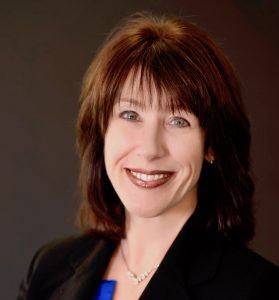UAFS chancellor touts value of higher education, community connection
by November 1, 2019 5:02 pm 447 views

The value of higher education is invaluable, not only to individuals, but to a community as a whole. This was the message Dr. Terisa Riley, University of Arkansas at Fort Smith chancellor, presented Friday (Nov. 1) to those attending the First Friday Breakfast held by the Fort Smith Regional Chamber of Commerce.
Though generations of Americans in the past could obtain entry into the middle-class socioeconomic class with a high school diploma, that is not the case today, Riley said. But today, millions of jobs that made that possible have been replaced by technology and global competition. The jobs that remain demand a higher education, Riley said, noting that higher education includes certificates that allow a person to be workforce ready, associate degrees, bachelor’s degrees and post-graduate degrees.
The Bureau of Labor Statistics shows that between the years 2014-2024, jobs requiring post-secondary education will grow “by leaps and bounds,” she said. Jobs requiring a certificate will grow by 11.5%, bachelor’s degree over 8%, master’s degrees by 13.8% and doctoral degrees by 12.2%, she added.
That level of growth in jobs that demand post-secondary education means that UAFS remains relevant and crucial to this community success and investing in the people attending the school and the institution itself is equally important, Riley said.
Individuals who go on to complete post-secondary education open the door to more opportunities. They have higher lifetime earnings, better long-term career opportunities, better employment benefits and stronger job stability.
“One of the things we have learned, particularly in times of recession, … (is that) individuals with post-secondary educations have a much easier opportunity to rebound after a recession,” Riley said.

Long term career opportunities also mean higher lifetime earned income. Individuals with a bachelor’s degree earn over their lifetime $1.2 million more than someone who has a high school diploma or GED, she said. The value of these individuals earning these degrees and certificates is equally beneficial to the community and region, Riley said. These students are more likely to own homes and pay sales, property and income taxes and are less likely to depend on taxpayers for health care and less likely to be incarcerated, she said.
“The benefits to the community are far-reaching and go way beyond the individual just being employed with an organization,” Riley said. “Our goal at the University of Arkansas at Fort Smith is to produce the individuals you would love to have sitting next to you this morning.”
Studies show that 60% of the individuals between 25 and 64 must have some form of post-secondary education by the year 2025 in order to meet the workforce needs of the region, Riley said. Currently, 41.5% of those individuals in Arkansas have a post-secondary education making the state 46th out of the 51 states and territory of Puerto Rico, she said. Sebastian County dips lower with only 28% of the residents ages 25-64 having post-secondary degrees.
50% of graduating high school students in Fort Smith have plans to continue their education, Riley said. In order to combat this, UAFS is working to encourage more high school students to earn certificates that will make them work-force ready while in high school; increase the number of high school students taking concurrent college course along with their high school curriculum; streamline course offering to ensure students can graduate with a bachelor’s degree in four years; encourage more high school students to pursue degree programs; and increase the number of fully online degrees.
The university also has implemented goals to help non-traditional students who are already in the workforce to earn degrees and certificates. These include creating certificate programs to be earned “on the job” and working professional course schedules for adult learners who work or support families.
“We hope that through being educated at the University of Arkansas at Fort Smith and participating in our Fort Smith community, they are going to love (the job they chose to do),” Riley said.
